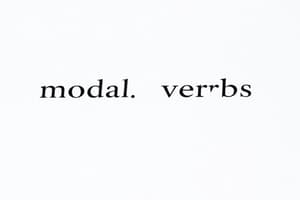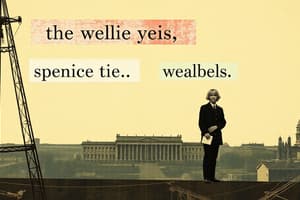Podcast
Questions and Answers
In which context is 'could' correctly used?
In which context is 'could' correctly used?
- She may finish her project next week.
- They might go to the concert.
- I can swim very well.
- I could run a mile in 5 minutes when I was in high school. (correct)
How can 'may' and 'might' be distinguished in terms of certainty?
How can 'may' and 'might' be distinguished in terms of certainty?
- May indicates a higher degree of certainty than might. (correct)
- Neither can express likelihood.
- Both are used interchangeably with equal certainty.
- Might indicates a higher degree of certainty than may.
Which sentence correctly uses 'can' to ask permission?
Which sentence correctly uses 'can' to ask permission?
- You can come to the party with friends.
- Can I borrow your pen for a moment? (correct)
- She can leave early today.
- I can borrow your pen after class.
Which of the following statements is a correct negative form of 'could'?
Which of the following statements is a correct negative form of 'could'?
What is the correct structure for a question using 'can'?
What is the correct structure for a question using 'can'?
What function does 'could' serve when referring to past abilities?
What function does 'could' serve when referring to past abilities?
Which of the following sentences utilizes 'might' correctly?
Which of the following sentences utilizes 'might' correctly?
Which sentence best exhibits the use of 'could' for making a polite request?
Which sentence best exhibits the use of 'could' for making a polite request?
What does 'could have' imply in terms of actions?
What does 'could have' imply in terms of actions?
When is 'should have' typically used?
When is 'should have' typically used?
What does 'must have' signify in a statement?
What does 'must have' signify in a statement?
In which scenario would one use 'would have'?
In which scenario would one use 'would have'?
Which of the following sentences correctly utilizes 'could have'?
Which of the following sentences correctly utilizes 'could have'?
Select the statement that represents the use of 'must have' correctly.
Select the statement that represents the use of 'must have' correctly.
Identify the sentence that is an example of 'should have'.
Identify the sentence that is an example of 'should have'.
Which modal best fits the context: 'He _____ gone to the concert if he had known about it.'?
Which modal best fits the context: 'He _____ gone to the concert if he had known about it.'?
What is the primary difference in the use of 'may' and 'might' when making requests?
What is the primary difference in the use of 'may' and 'might' when making requests?
Which sentence correctly uses 'shall' to express suggestion?
Which sentence correctly uses 'shall' to express suggestion?
How should one form a negative sentence using the modal 'will'?
How should one form a negative sentence using the modal 'will'?
What distinguishes 'must' from 'should' in usage?
What distinguishes 'must' from 'should' in usage?
Which of the following sentences uses 'would' correctly?
Which of the following sentences uses 'would' correctly?
What is the function of the modal verb 'would' in the sentence: 'Would you help me with these boxes?'
What is the function of the modal verb 'would' in the sentence: 'Would you help me with these boxes?'
Which of the following correctly utilizes the structure for forming a question with 'might'?
Which of the following correctly utilizes the structure for forming a question with 'might'?
When forming a negative with 'might', where should 'not' be placed?
When forming a negative with 'might', where should 'not' be placed?
What does 'shan't' represent in English?
What does 'shan't' represent in English?
Which scenario best describes the use of 'must'?
Which scenario best describes the use of 'must'?
How do you form a question using the modal 'shall'?
How do you form a question using the modal 'shall'?
In which situation is 'should' most appropriately used?
In which situation is 'should' most appropriately used?
What is the contraction form of 'would not'?
What is the contraction form of 'would not'?
What is an example of a polite request using 'may'?
What is an example of a polite request using 'may'?
Flashcards
Can (verb)
Can (verb)
A modal verb expressing ability, possibility, or permission.
Could
Could
A modal verb expressing possibility, or a more polite way to ask for permission than 'can'. It can also indicate a past ability.
Can't
Can't
The negative form of 'can'.
Couldn't
Couldn't
Signup and view all the flashcards
May
May
Signup and view all the flashcards
Might
Might
Signup and view all the flashcards
Modal Verbs
Modal Verbs
Signup and view all the flashcards
Negative Form (Modals)
Negative Form (Modals)
Signup and view all the flashcards
Could have
Could have
Signup and view all the flashcards
Should have
Should have
Signup and view all the flashcards
Must have
Must have
Signup and view all the flashcards
Would have
Would have
Signup and view all the flashcards
Past Perfect with Modals
Past Perfect with Modals
Signup and view all the flashcards
Modal Verbs + Have
Modal Verbs + Have
Signup and view all the flashcards
Could have + Supposition
Could have + Supposition
Signup and view all the flashcards
Must have + Logical Deduction
Must have + Logical Deduction
Signup and view all the flashcards
May vs. Might
May vs. Might
Signup and view all the flashcards
Will vs. Shall
Will vs. Shall
Signup and view all the flashcards
Will/Shall Negative
Will/Shall Negative
Signup and view all the flashcards
Would (past habit)
Would (past habit)
Signup and view all the flashcards
Would (past wish/request)
Would (past wish/request)
Signup and view all the flashcards
Would (reporting speech)
Would (reporting speech)
Signup and view all the flashcards
May (polite request)
May (polite request)
Signup and view all the flashcards
Might (polite request)
Might (polite request)
Signup and view all the flashcards
Would Negative
Would Negative
Signup and view all the flashcards
Would Question
Would Question
Signup and view all the flashcards
Must (opinion)
Must (opinion)
Signup and view all the flashcards
Should (giving advice)
Should (giving advice)
Signup and view all the flashcards
Study Notes
Modal Verbs: Can, Could, May, Might, Will, Shall, Would, Must, Should
- Can/Could: Used for expressing ability, possibility, or asking permission.
- Can: Used for present ability and permission; "She can sing." "Can I ask you a question?"
- Could: Used for past ability; "When I was young, I could run fast." Used for expressing possibility or more polite requests; "Could you help me?"
- Negative: Add "not" after modal verb (can't, couldn't).
- Questions: Invert subject and modal verb (Can I...?, Could you...?)
Modal Verbs: May, Might
- May/Might: Used for expressing possibility or less certain predictions about the future.
- May: Implies a higher degree of probability (more likely to happen).
- Might: Implies a lower degree of probability (less likely to happen).
- Usage: Express possibility, requests, past requirements.
- Negative: Add "not" after modal verb (may not, might not).
- Questions: Invert subject and modal verb (May I...? Might I...?)
Modal Verbs: Will, Shall
- Will/Shall: Used for expressing future actions, predictions, or intentions.
- Will: Used for future predictions or intentions; "I'll be back soon."
- Shall: Used for more formal future predictions or suggestions, typically with "I" or "we"; "Shall we leave now?"
- Negative: Add "not" after modal verb (won't, shan't).
- Questions: Invert subject and modal verb (Will you...? Shall we...?)
Modal Verb: Would
- Would: Used for expressing past habits, desires or willingness; used for polite requests; used for reporting what someone else said.
- Past Habits/Habits: "When I was a child, I would go to the park every day."
- Past Desires/Willingness: "I would have gone if I could."
- Reporting Speech: "He said he would be there at 8."
- Polite Requests: "Would you mind helping me?"
- Negative: Add "not" after modal verb (wouldn't).
- Questions: Invert subject and modal verb (Would you...?).
Modal Verbs: Must, Should
- Must: Used for obligation, strong recommendations, or logical deductions; "You must be careful."
- Should: Used for advice, recommendations, or weak obligation; "You should eat more vegetables."
- Must: Expressing a strong belief; "The book is great, it must have been expensive."
Modal Verbs + Have (Past Perfect):
- Could have: Possibility in the past that didn't happen; "I could have gone to the party but I had other plans."
- Should have: An action that was expected or recommended but didn't happen; "You should have studied harder."
- Must have: A logical conclusion about a past action; "He must have been tired."
- Would have: Expressing something that would have happened in the past but didn't happen; "I would have helped you if I had known."
Studying That Suits You
Use AI to generate personalized quizzes and flashcards to suit your learning preferences.




